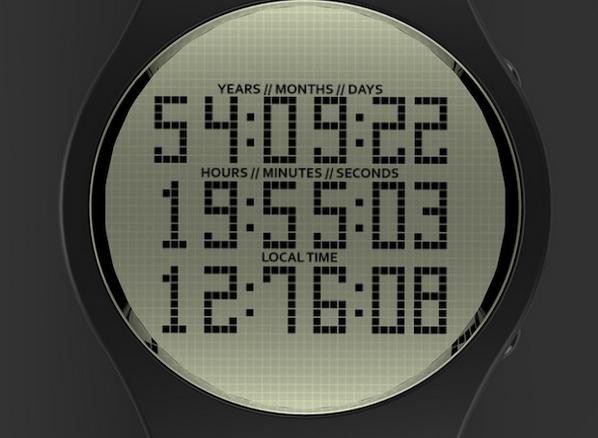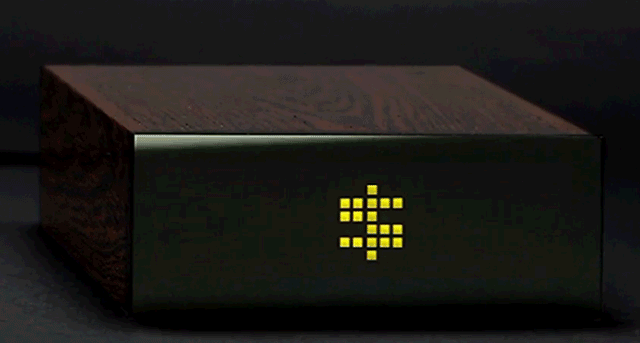Death Watch
by Aaron Gordon

Tikker is a normal-enough looking digital watch. Nobody needs to know that every time you glance down to check the time, you’re also checking on your death. It’s “the watch that counts down your life.”
Unlike Tikker, ALARMclock has a sleek, faux-retro design, with simplistic LED display. Upon waking, the prototype tells you how much money and how many social network “friends” you have, along with how many days left you have to live based on fairly common demographic information. It’s “the stuff that matters the most to the most people,” according to designer Al Kelly.
Tikker received almost $100,000 in its Kickstarter funding that ended early this month — roughly four times its goal. ALARMclock, whose Kickstarter ends tomorrow, raised more than $25,000, despite having only a $7,000 target. Depending how much you subscribe to the whole the-free-market-reveals-preferences thing, this either demonstrates a deep cultural obsession with our own demise — or that there are at least 2,427 weirdos out there willing to give money for a digital representation of the obvious. Yes, we’re going to die.

That’s at least what this mortality calculator, created by University of Pennsylvania staticians, told me. I will live 83.63 years. That number is high because of my exceedingly risk-averse life: I don’t smoke, rarely drive, exercise daily, and almost never drink. Whether this is a life worth living is another topic entirely which I have no intention of discussing here, but there’s always the comments section. I’m not sending out funeral invitations for April 26, 2073 or anything, though; death isn’t something you can predict with such accuracy. There are probabilities, likelihoods, trends and statistics, but none of those account for determining if I will be a victim of a random mortal deed tomorrow, next week, etc. Some people say it’s best not to think about such things for our own sanity, but good luck with that.
The mortality calculator — one of the few online that doesn’t come with a malware warning, which seems like Google’s exact brand of macabre sense of humor — acknowledges all this. According to its co-creator, Professor Dean Foster, that number is plus or minus five years, which yields more of a Death Range. Even then, you could call that only “half” accurate; you have a one-in-four chance of dying before that range, and an equal chance of living longer than it predicts.
I have a 50 percent chance of dying between 2068 and 2078.
Although more statistically and scientifically responsible, this is far less satisfying. It’s missing that faux-precision that a single number or date brings. The point is not for you to be ready for the exact moment, but so you don’t spend your entire life waiting for it.
Both Tikker and ALARMclock are presented as reminders: that your life is finite, that one day, if you’re lucky, you will be forced to consider a summation of your total existence and also whether you’ll be satisfied with that simplistic reflection of yourself. Yes, that’s if you even have time to consider such matters before you meet your end.
The founders acknowledge ALARMclock isn’t for everyone: “I think the kind of person who buys this has some fascination with the morbid.” The certainty of death can’t be a wholly unpleasant one to you. It has to be a simple fact of your existence, or perhaps something you find a little comfort or dark humor in.
Both creators, actually, think a constant reminder of death can make you happier.

ALARMclock’s founders came to the idea while working on their development startup, Fig. “We’d been going through typical startup growing pains, working long hours and weekends. We found ourselves wondering what — besides coffee and nicotine — could help us stay focused. What if scary data, some articulation of the things we worry about most in modern life, could be used to get us out of bed and hit the ground running?” When I asked them what, exactly, ALARMclock is selling, co-creator Al Kelly turned to the post-recession economy: “The current economic climate sucks and doesn’t seem like its getting better anytime soon. There’s a feeling that maybe we need to embrace this new reality, adjust our expectations, and dig in for the long haul, to accept circumstances as they are without losing our sense of humor.”
ALARMclock is selling perspective and motivation to achieve whatever basic goals you consider most valued in our post-industrial human existence: money, love, how much time you have left to enjoy both. Similarly, when I asked Fredrik Colting, Tikker’s founder, if his watch is selling happiness, he channeled his inner philosopher: “Happiness is as much a choice as it is a circumstance, and we need to be reminded of that… it’s a piece of simple technology created to make us happier.”
Colting and his crew have no underlying philosophy or worldview motivating Tikker’s production. Colting chose “curiosity” as his belief system; about time, about the purpose of life, and about how to make the most out of both. To that end, Tikker’s website has a “Bucketlists” section, including items such as: “Only eat things I really like; Quit my job and watch every movie I always wished I had watched; Go through every sexual position in the Kamasutra” and one near and dear to my heart: “Tell the girl at the coffee place that I love her.”
I have 21,703 days to live.


Both project founders hope you might make decisions that will lead to a better or more fulfilling life. Maybe you start taking the advice of certain “How To Live Longer” articles that recommend you be an employed, wealthy, literate, optimistic, active, slim-waisted Mormon woman living in Hawaii who drinks moderately (despite being Mormon) married to a person your own age and that you sleep seven hours a night without watching TV.
According to Professor Foster, though, there’s not much you can do to push back your death date. We like to think that the awful diet we’re on makes us live a whole lot longer, but you’re adding mere months — not years — during which life likely won’t be all that pleasant anyways (what with the possible senility and/or involuntary bowel movements). The little we know about life expectancy says most of it is determined the moment you’re born.
“A lot of the health habits you worry about don’t really make a big difference,” Foster said. Take weight, for example. Everyone tells us overweight people will be first to go by a long shot, but in actuality, it’s not, on average, really much sooner than the fit. According to Foster, “If you adjust your weight from, say, overweight to the ideal weight — which most people find very challenging — it might make you live a month longer.”
Even worse, for every hour you spend at the gym, you can expect a 2–3 hour extension of your life. If you spent that hour working a minimum wage job and saved the earnings, you could retire a whole day earlier. As our inventors would say, it’s all about perspective.
If it’s true that we non-smokers can’t appreciably extend our lives, then everything we do to cling to the foot of life as it stomps on our faces rather has a rearranging-the-deck-chairs feel to it. This makes the finite time we have even more vital to get right. This is where ALARMclock starts sounding more appealing. They’re building the capability to customize the information displayed via an online dashboard. If you’re passionate about the environment, you can have the clock display global emission levels. If your company’s stock price is your sole reason for existence, set that up. Are you an athlete who only cares about winning? Have your team’s record or your personal statistics greet you every morning. “It’s whatever gets you going in the morning or that you worry about the most,” Al said. You could, of course, even turn the life expectancy display off.
As I was speaking to Al and his team, the whole project was coming into perspective. There are things that matter to each of us, and time can sometimes seem limitless when enjoying not-so-simple pleasures like a beer that refills from the bottom-up or, I suppose, the joys of family. We don’t always remember that we have a fixed amount of time for all this. For whatever the inclusive set of {life} may be for you, usually by the time we do figure this cosmic reality out, like the brilliant species we are, our kids are already out of the house (with any luck) and/or retirement is around the corner (with a little more luck), and there’s so little time left for anything else. What you hoped to accomplish starts sounding dangerously close to a Miss America speech.
It’s all so grotesquely noble, accomplishing things. Simply prospering so we aren’t forced to consume our own young for sustenance seems like a noble enough goal to me. Given that’s not the world we live in anymore, perhaps we wouldn’t spend so much time forwarding listicles we found amusing — or getting into Twitter debates regarding the merits/rankings of said listicles — if we remembered that one day quite soon we’ll all be dead and no one will give a shit about listicles. Maybe this is something we should be reminded of every morning after all, and a simple Post-It note won’t do. Those are too easy to throw away.
I have 1,875,139,200 seconds left. Or, should I say, I had 1,875,139,200 seconds left.
Aaron Gordon is a contributing writer at Sports On Earth. He has also written for The Classical, BuzzFeed and Pacific Standard. Although he currently lives in Washington, D.C., his heart will always be with the Hartford Whalers. He also tweets a lot @A_W_Gordon.
